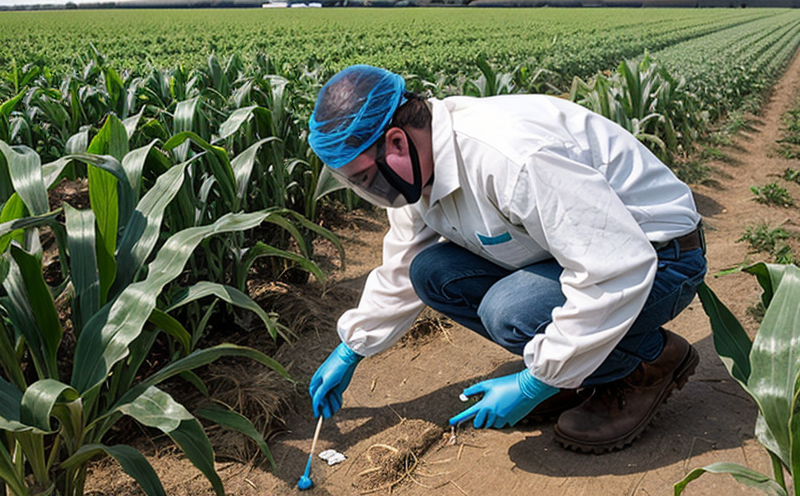Cyantraniliprole Residue Testing in Crops
When it comes to pesticide residue testing, Cyantraniliprole stands out as a critical component within the broader scope of agricultural chemical management. Cyantraniliprole is an insecticide used primarily for controlling lepidopteran pests such as caterpillars and leafworms. Its presence in crops must be monitored meticulously due to stringent regulatory requirements aimed at ensuring food safety and environmental protection.
The importance of residue testing cannot be overstated, especially when dealing with pesticides like Cyantraniliprole. Regulatory bodies worldwide enforce strict limits on the maximum allowable levels of pesticide residues in agricultural products. These regulations are designed not only to safeguard public health but also to maintain the integrity of global food supply chains.
In this context, our laboratory offers comprehensive Cyantraniliprole residue testing services tailored specifically for various crop types, including fruits, vegetables, and grains. Our expertise lies in providing accurate, reliable, and compliant results that meet international standards such as ISO 18567:2019.
Our approach begins with meticulous sample preparation, ensuring that each specimen is representative of the entire batch being tested. This step involves thorough washing and drying techniques to remove any surface contaminants before analysis. Following this, advanced analytical instruments are employed to detect trace amounts of Cyantraniliprole residues accurately.
The analytical methods used in our laboratory adhere strictly to international standards like ISO 18567:2019, which provides guidelines for the determination of cyantraniliprole in fruits and vegetables. These methods ensure consistent and reproducible results across different laboratories worldwide.
Our commitment extends beyond mere compliance; we strive to provide actionable insights through detailed reports that outline not only the presence but also the concentration levels of Cyantraniliprole residues found in your crops. This information can help you make informed decisions regarding future applications or adjustments in pest management strategies.
To further illustrate our capabilities, here are some key aspects of our Cyantraniliprole residue testing service:
- Comprehensive sample preparation procedures
- State-of-the-art analytical instrumentation
- Strict adherence to international standards
- Detailed and actionable reporting
In conclusion, choosing reliable Cyantraniliprole residue testing is crucial for maintaining both product quality and consumer trust. By partnering with our laboratory, you gain access to cutting-edge technology and experienced professionals who will ensure compliance with all relevant regulations.
Industry Applications
In the realm of agriculture, Cyantraniliprole residue testing plays a pivotal role in ensuring that crops meet stringent quality standards. This is particularly important for export markets where foreign governments enforce rigorous inspection processes before allowing products into their countries.
For research and development teams within agricultural companies, accurate residue testing helps identify potential issues early on so corrective actions can be taken promptly. Additionally, it allows them to optimize application rates without compromising effectiveness or safety.
Cyantraniliprole residue testing also benefits procurement departments by providing assurance that suppliers are adhering to best practices in pest control. This ensures consistency across supply chains and supports long-term relationships with trusted partners.
Why Choose This Test
The decision to opt for Cyantraniliprole residue testing can significantly impact your business operations by fostering trust among consumers, stakeholders, and regulatory authorities alike. Here are several compelling reasons why this test should be part of your quality assurance program:
Compliance with international standards.
Protection against non-compliance penalties.
In addition to these tangible benefits, choosing Cyantraniliprole residue testing demonstrates a commitment to sustainable farming practices and responsible use of pesticides. This proactive approach enhances your company’s reputation as an ethical player in the global agricultural sector.
Customer Impact and Satisfaction
The outcomes of our Cyantraniliprole residue tests have direct implications on various stakeholders, including farmers, retailers, consumers, and regulatory bodies. Let us explore how these results contribute positively to each group:
Farmers: By ensuring their products meet required standards, they enhance marketability and avoid costly rejections.
Retailers: They can confidently offer pesticide-free produce to their customers, thereby building brand loyalty.
For consumers, peace of mind knowing that the food they consume adheres to strict safety guidelines fosters trust in agricultural businesses. Lastly, regulatory bodies appreciate having reliable data to enforce regulations effectively and protect public health.





